5 Subtle Ways Hollywood Taught You To Be A Worse Person

Whether we admit it or not, most of us will spend our adult lives trying to unlearn the shit pop culture taught us when we were growing up. As regular readers know, said shit ranges from the little things (no, you aren't guaranteed "one phone call" in jail) to broad life principles (no, a few months of frantic training won't let you take on experts who've been doing it their whole lives). This is a long-running theme here at Cracked and while we can be pretty hard on Hollywood, really none of this is their fault.
See, there are some basic reasons why movies (and games, and TV, and songs, and comics ... ) are really terrible at delivering lessons on how to live your life, no matter how hard they try.
Movies Can't Help But Make Conflict Look Like Fun

To illustrate what I'm talking about here, just look for the cut on the bridge of the hero's nose.
When a handsome action star is at his lowest point -- when he's been beaten and wounded and you're supposed to really feel the terrible toll the conflict has taken on him, Hollywood conveys it with a very specific wound. That little cut on the bridge of the nose that only makes them sexier:

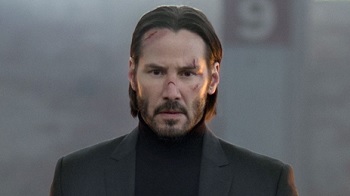
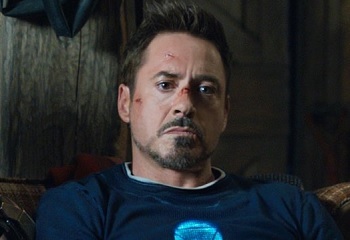
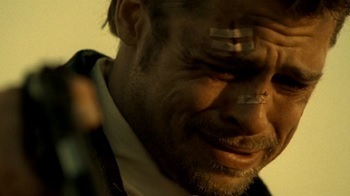

I've looked worse than that after yard work.
My favorite example of this comes from Game Of Thrones. In the books, Tyrion Lannister's facial wounds are described thusly:
"Three-quarters of his nose was gone, and a chunk of his lip. Someone had sewn the torn flesh together with catgut, and their clumsy stitches were still in place across the seam of raw, red, half-healed flesh."
And, of course, here's how the show interpreted that:

"Three one-hundredths of his nose was gone, but his lip was still strong and sensual. Aww yeah."
That, right there, symbolizes the just balls-out hilarious mixed message Hollywood sends about, well, everything. In this case, what they're saying about violence/conflict clashes spectacularly with what they're showing. "Avoid fighting at all costs, children, or else you'll get this badass, sexy, totally painless scar!"
Now, tell me how many times you've seen this: We're on the verge of a battle, and a thoughtful warrior bemoans the need for bloodshed:
William "Braveheart" Wallace: "I came back home to raise crops, and, God willing, a family. If I can live in peace, I will."
Faramir from The Lord Of The Rings (looking at a fallen enemy soldier): "His sense of duty was no less than yours ... war will make corpses of us all."
Yoda: "'A great warrior?' Wars not make one great, you cock."
Then, within a few minutes, comes the most beautifully choreographed, thrilling, badass, orgasmic action you've ever seen. At the end of which, the good guys stand victorious, as the battle has solved all of their problems.


"Hey, everybody! We're all gonna get laid!"
So, yeah, kind of a mixed message there. Actually, no -- it's not mixed at all. A famous filmmaker once said there is no such thing as an anti-war movie, because violence just looks too awesome on screen. Military hardware looks cool, guys look sexy in uniform, and explosions are pretty. The camera captures the most flattering, noble angles, and the editor cuts it together in a way that gets your heart pumping. When the good guys die, they die courageous, meaningful deaths.

Seventeen percent of which are done by Sean Bean.
Yes, this is even true when the movie is openly anti-war. At the end of Saving Private Ryan, Tom Hanks still gets his powerful, dying monologue.

" -- and that's all I have to say about that."
In real life, those final moments are full of screaming and retching, grizzled men begging for their mothers and spraying shit into their pants. They're not kneeling in front of a gorgeous sunset and contemplating the nobility of their cause. They're clutching loops of intestine that have flopped out of the ragged hole in their gut and gurgling their own blood. But, who wants to watch that?
The most recent "anti-war" movie I saw was Fury, that Brad Pitt tank movie in which the good guys spend much of its running time talking about how war is a dehumanizing horror ("Wait until you see it ... What a man can do to another man.") Pitt's character (spoiler!) predictably meets his end in a climactic battle scene in which he mows down hundreds of faceless Nazis, finally succumbing to the many wounds he had heroically fought through up to that point. Now, go to Google and start to search for "Brad Pitt Fury," and see what it auto-completes to:
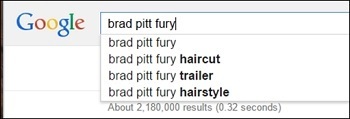
"Haircut." That's what we took away from it. "That dude who tragically died as a perfect symbol of man's inhumanity to man? How can I look as handsome as him?"

Clearly, it's the hair!
Yeah, that's the other thing. The whole time Brad Pitt was showing us how awful it would be to die in a war, he did it while looking like Brad Pitt. But, we'll come back to that in a moment. First, there's a corollary to the whole "conflict always looks like fun" problem ...
Dialogue Has To Be Entertaining, And That Means Lots Of Pointless Insults

For our next example, we'll pull a random scene from a random episode of Friends. Chandler needs a tailor who can make him a suit, and the following exchange occurs:
Joey: "Why don't you go see Frankie? My family's been going to him forever. He did my first suit when I was 15. No, wait, 16. No, excuse me, 15. All right, when was 1990?"
Chandler (angrily interrupting): "OK, you have to stop the Q-tip when there's resistance."
You know, implying that Joey has brain damage because he accidentally stabbed his brain through his ear canal.
Laugh track kicks in, Chandler walks away having delivered the sick burn, Joey turns around, and that's the end of the conversation. You've seen the equivalent literally 10 thousand times on-screen; Aaron Sorkin's movies usually involve characters spraying these dismissive insults at each other like machine-gun fire:
Now, in real life, Joey would have replied with something to the effect of, "I was trying to help you out and that's the way you talk to me, you ungrateful fuck?" Or, more realistically, they would never have become friends in the first place, because Chandler would have severed all of his friendships years earlier and, realizing he was alone, eaten his gun. But, even within the universe of that show, what was that insult meant to accomplish?
Communication is, after all, intended to deliver information to another person to accomplish some goal. Even if it's an insult, it's because you're communicating to them that they've made you angry, in order to correct future behavior ("Get your shoes off my sofa, you goddamned slob"). Note that this is not the same thing as banter, lighthearted barbs that signal familiarity, but never touch truly sensitive ground. When a dude says, "Yeah, that's what your mom said last night while I was banging her!" it's specifically because the listener knows he didn't actually bang his mom.

"That's right; I only bang my friend's sisters."
But, in the Friends exchange above, you don't have any of that. So, why did Chandler do it? The answer, of course, is Chandler knows he's on a TV show and that there is a third party to the conversation: us, the audience. What he said only makes sense in that context, and no other -- never in the history of real conversation has a "sick burn" like Chandler's made things better.
But we do it anyway.
In fact, we build entire fictional universes around it.
If you were raised on television like I was (and thus have more hours invested in listening to fictional arguments than real ones), you've been trained to talk that way. That is, to deliver quips crafted to be funny and biting at the expense of the person you're speaking to ... even if there is no one there to laugh at them. I bet if you went over a transcript of your last bad fight with a significant other, you would find tons of this shit:
Her: "Well, maybe it's time you finally got a job!"
You: "Oh, like you're soooo proud to work at Starbucks! Hey, maybe someday you can rise to the top of the field of misspelling names on cups! Twenty years from now, maybe you can be misspelling the names of cities on water towers! Reach for the stars, girl!"
Remember, the fictional sarcastic assholes we all love have inhuman amounts of money, knowledge, and talent.
That's not communication -- it's a performance. And we do it all the time; instead of trying to say the thing that makes the other person come around and actually do what you want him or her to do, you're trying to make it entertaining for a camera that isn't there. It's kind of like how the sexual positions in porn are only intended to look good for the camera, rather than give anyone any actual pleasure. It's fine to watch, but the moment you bring that shit into the bedroom, somebody's gonna wind up in the emergency room with crushed testicles.
Actors Are Charismatic, Even When Playing Villains

Let's say you're a big-shot executive at a movie studio. On your desk, underneath a massive pile of cocaine, you've got a great, award-winning script about the rise and fall of a man who gets seduced by greed. It's a cautionary tale, meant to make the audience understand the seductive nature of evil. But, here's your dilemma: Unless that evil main character is sexy, cool, funny, and charismatic, nobody will want to watch your movie. So, you do what you have to do, and, a year later, you watch as people stick your bad guy's face on their walls ...

... and on T-shirts ...
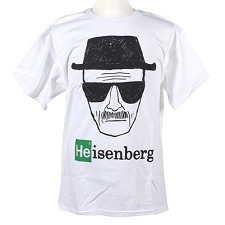
... and dress up like him for Halloween:

A crime against logic and creativity.
There is no way around it. No matter how much the script makes Jordan Belfort look like a sleazebag, it's all lost the moment you cast Leo DiCaprio. "Yes, how tragic that this incredibly handsome man got so out of control that he had tons of handsome sex with lots of gorgeous women on his yacht, while high on cocaine. I hope such a thing never happens to me."

"Is this the type of hellish life you want? Look at it. Look at it!"
You can even devote the whole last hour of the movie to shooting down everything the antihero character stands for -- it doesn't matter. How many dudes did you know in college who quoted Tyler Durden, ignoring the fact that the entire second half of the film explains why his philosophy is selfish, simplistic, and destructive?

And ignored the irony of buying a cheaply made, overpriced T-shirt featuring an anti-capitalist character?
The fact is that humans are social animals and charisma hacks our brains, overriding all logic. So, you're taking a movie star -- already the product of a system designed to filter out all but the coolest of the cool -- and giving him a team of makeup artists and hair stylists, putting him under perfect lighting, carefully constructing his wardrobe, and giving him badass lines crafted over the course of months by a team of professional writers. The film could be about a guy who eats human shit as a hobby, and we would still walk out half-wanting to try some for ourselves.
Think I'm exaggerating? Replace "eating shit" with "smoking cigarettes," and you'll get the picture (and at least eating shit never gave anyone cancer).

Guess what Bogie died from. Go on, guess.
What, you figured you came out of the womb thinking smoking was cool? But, that just brings us to ...

Bad Habits Make Characters Cool, But They Can't Suffer Real Consequences

Here's a writing tip, from somebody who has written a few things and by a few I mean three: A "cool" character needs to simultaneously be better than the audience, yet also with enough flaws to seem relatable. That's why Tony Stark has a drinking problem.
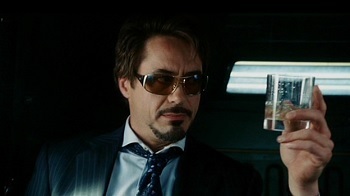
"The whole reason I invented J.A.R.V.I.S. was to always have a designated driver."
And here we once again get into the whole "mixed messages" thing. For example, I know first-hand that if you're trying to lose weight, the first thing you notice is that people in movies and TV shows have terrible diets, yet remain thin as movie stars. Breakfast is usually bacon and eggs ...

Lunch is usually burgers and beer ...

Snacks are ice cream ...

And dinner is always, always a whimsical wizard banquet:

And holy mother of shit, I can't imagine what it's like to be a recovering alcoholic and watching, well, any TV show. If the character is cool and sophisticated, you can bet your ass they're going to have that little glass of brown liquor in their hand:




"It's a post-breakfast cocktail. Calm down."
Don Draper has to be the poster boy for this -- that handsome bastard is depicted as consuming 500 percent more alcohol than what it would take to qualify him as a "heavy drinker" by the CDC's standards. Twenty percent of those drinks are consumed at his office, more than half of those before lunch. The man should be dead several times over, his liver having burst into flame in mid-pitch.
Now, obviously movie characters smoke, drink, and do drugs for the same reason most of you started -- it looks cool. Or rather, the opposite is uncool -- what's more of a downer than somebody who's always staying sober during a party or counting calories at the restaurant? People with bad habits are "fun" because they make us comfortable with our own, whether those people are real or fictional. The difference is that people in real life who eat like movie characters get fat.

And people who eat like fat movie characters get dead.
That right there is the other half of the equation, the paradox that winds up sending the worst message possible. We need these characters to have the flawed habits, but without any of the human consequences. Oh, sure, they'll do an alcoholism story line, but the damage done is the equivalent of, well, a cut across the bridge of the nose. An overdosing Leo DiCaprio isn't tragic, it's hilarious:

He consumes enough drugs and alcohol to kill a rhino, and his comeuppance is wacky slapstick.
Almost as hilarious, in fact, as a drunk Peter Dinklage.

He needs to drink off the intense mental trauma that comes from suffering such a horrible wound.
It's no different than how Hollywood treats warfare: Everyone gives lip service to the terrible toll it takes, but it's still fun as hell to watch. In the end, the good guys either defeat their demons, or at least temporarily rise above them when it really matters. That's because ...
In Fiction, Unlike Life, Every Problem Has A Clear Solution

Hey, did you have a bully when you were a kid (or, you know, now)? Did you go through that process where you tried standing up to him (it turns out he loves to fight!), then tried being friendly (he called me a series of anti-gay slurs!), then tried ignoring him altogether (it turns out nothing enrages him more!), and then finally came to the realization that there was no easy answer because he simply had every possible advantage? That's a big growing up moment, realizing that he's simply stronger and on a higher tier. All you can do is accept it and hope he gets bored.
Well, that scenario -- the problem that has no definitive solution -- virtually never happens in pop culture.
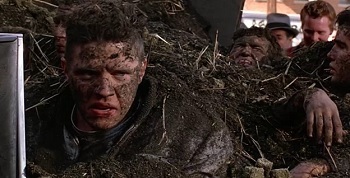
In real life, there's rarely a giant conveniently placed pile of manure around when you need one.
The implicit deal every video game makes with the player is that, if there is a keyhole in the dungeon door, somewhere in that dungeon there is a key that fits it. Behind that door is a dragon, and that dragon can be defeated, if you make the right choices. In movies, it's basic story structure -- we meet the main character, they face a problem, and they solve it. And once it's solved, it fucking stays solved. If a movie ever does present the main character with a "damned if you do, damned if you don't" dilemma, you can bet your ass that a third choice will swoop in and save the day at the last minute. Katniss is told she must commit murder in order to win the Hunger Games, then circumstances converge in just such a way as to allow her to win without a drop of blood on her hands.

Lenny Kravitz's dick has killed more pants than she does people in the death tournament.
We love it specifically because it's not like real life ... but then we proceed to venture out into real life with those very expectations in mind. And why wouldn't we? It's the religion all of us were raised under, one that movies, TV shows, and every commercial we've ever seen exists to reaffirm. To quote Film Critic Hulk, their goal is simple: "To make you feel like you have solutions to your problems."
Even though you don't have access to magical superscience.
It's the most seductive idea in the world, that all you have to do is meet the right girl, kill the right bad guy, buy the right product. Now, think about the really messed-up people you know, the ones whose lives are kind of a train wreck (or think of your own life, if you're the train wreck). How many of them can have their moment of crisis boiled down to one of these:
"So, doing all of those romantic gestures didn't make that girl/guy fall in love with me?"
"So, following my dreams didn't result in a successful career, or even a living wage? Because I actually have no talent at the thing I dream of doing?"
"So, moving to a new city/changing jobs/taking this pill didn't make me stop feeling like shit all the time?"
This isn't just some phase we go through in our 20s -- our leaders make goddamned policy based on this fantasy. If we can just kill the terrorists, terrorism will go away. If we arrest the drug dealers, we'll win the war on drugs. There's a lock, there must be a key. There's a dragon, surely a well-placed blow will slay it.
The reality is stupidly obvious, yet too painful to admit: When you go to interview for the dream job you're destined to have, you're going to be in line with three dozen other applicants who all think it's their destiny. All but one of you will go home a loser. According to Hollywood, that is a fate worse than death.
"Congratulations, you're hired! On your way out, can you please tell the other applicants
that complimentary nooses and cyanide pills are waiting in the lobby?"
And you know what? They're wrong. Because your life isn't a movie and the audience you're imagining is out there judging you, doesn't exist. Maybe you won't slay your dragon. Maybe nobody slays the dragon. Maybe the dungeon's janitor lost the key to that room years ago, and you just have to live with that fact. Maybe all you can do instead is just keep trying to get a little better every day, knowing that there's not going to be some great hero moment at the end of it and that you're not going to achieve perfection. You might never lose the weight, you might never find your soulmate, you might never get rich, you might never make all of the haters jealous.
Your life still has value either way. Don't let pop culture tell you different. This shit is hard enough as it is.
David Wong is the Executive Editor of Cracked.com and a NYT bestselling author; his long-awaited new novel is about cybernetic criminals and other futuristic shit like that. Pre-order it at Amazon, B&N, BAM!, Indiebound, iTunes, or Powell's. You can read the first seven chapters for free by clicking below:
Unlike Hollywood, David Wong is actually pretty good at giving advice. Get some more good brain food in 5 Helpful Answers To Society's Most Uncomfortable Questions and 5 Insane Things You Believe About Money (Thanks To Movies).
Subscribe to our YouTube channel for more just awful pointers in movies in The 3 Worst Lessons Taught by 80s Sports Movies, as well as watch other videos you won't see on the site!
Also, follow us on Facebook, where all sorts of angry commenters will give you bad advice.